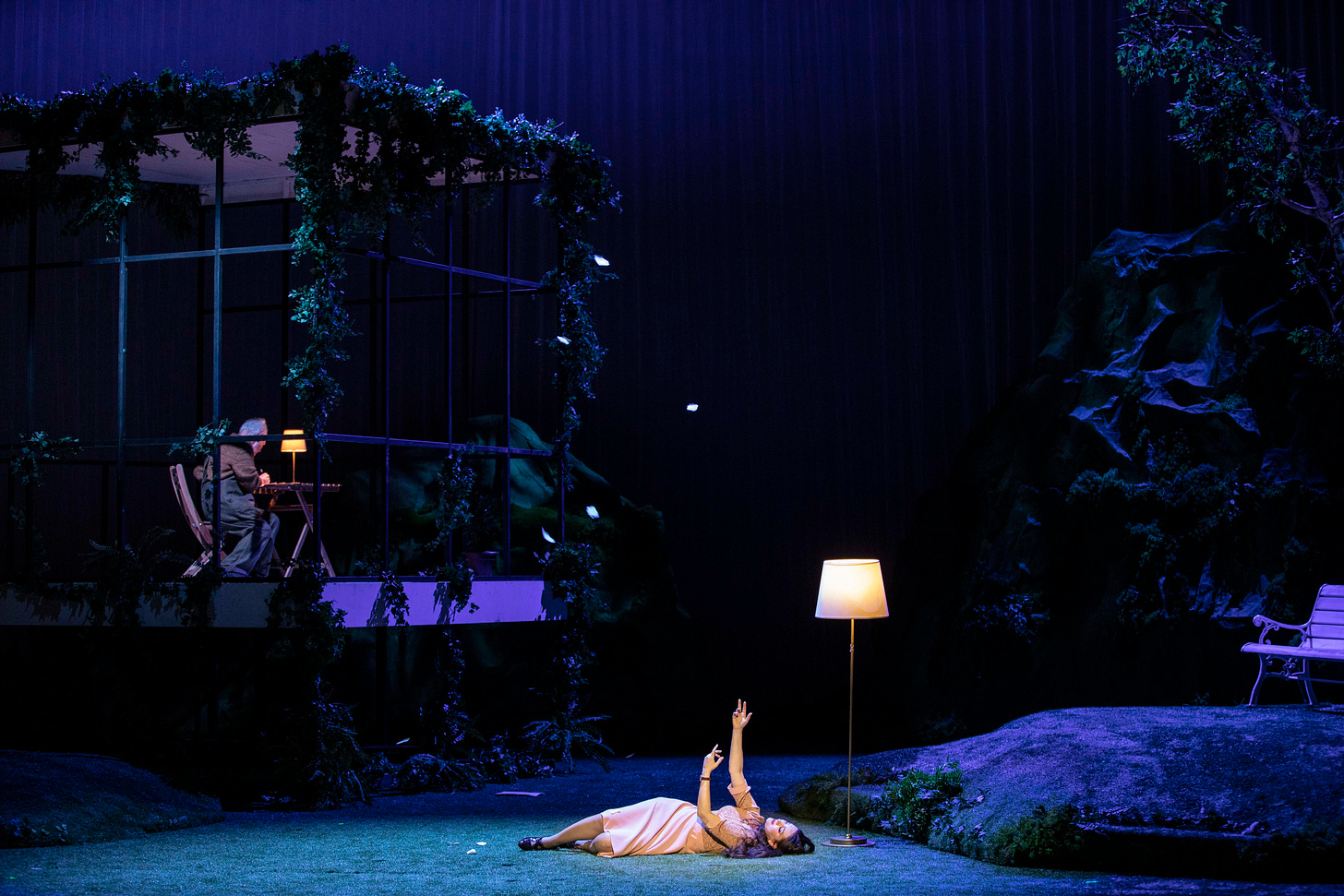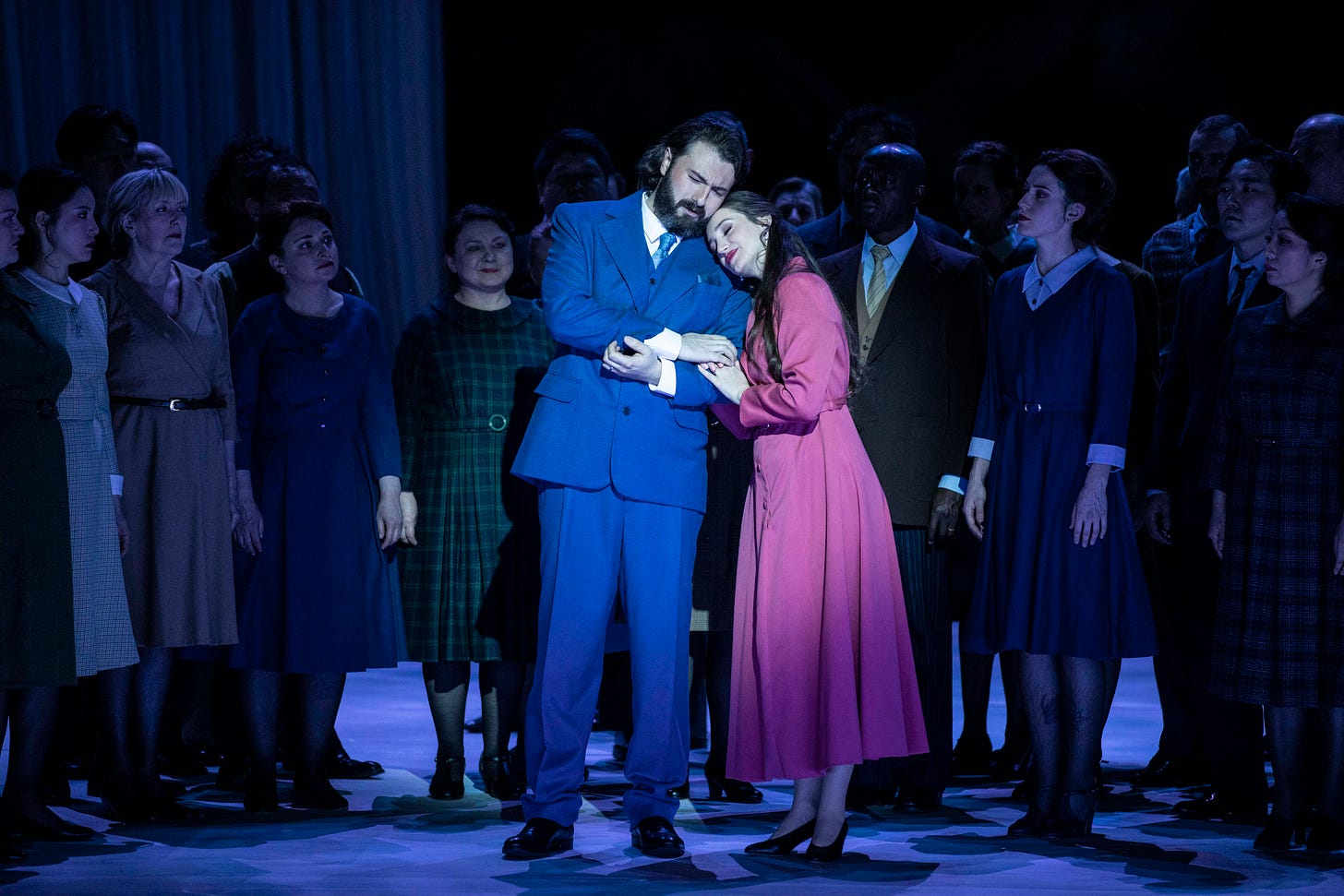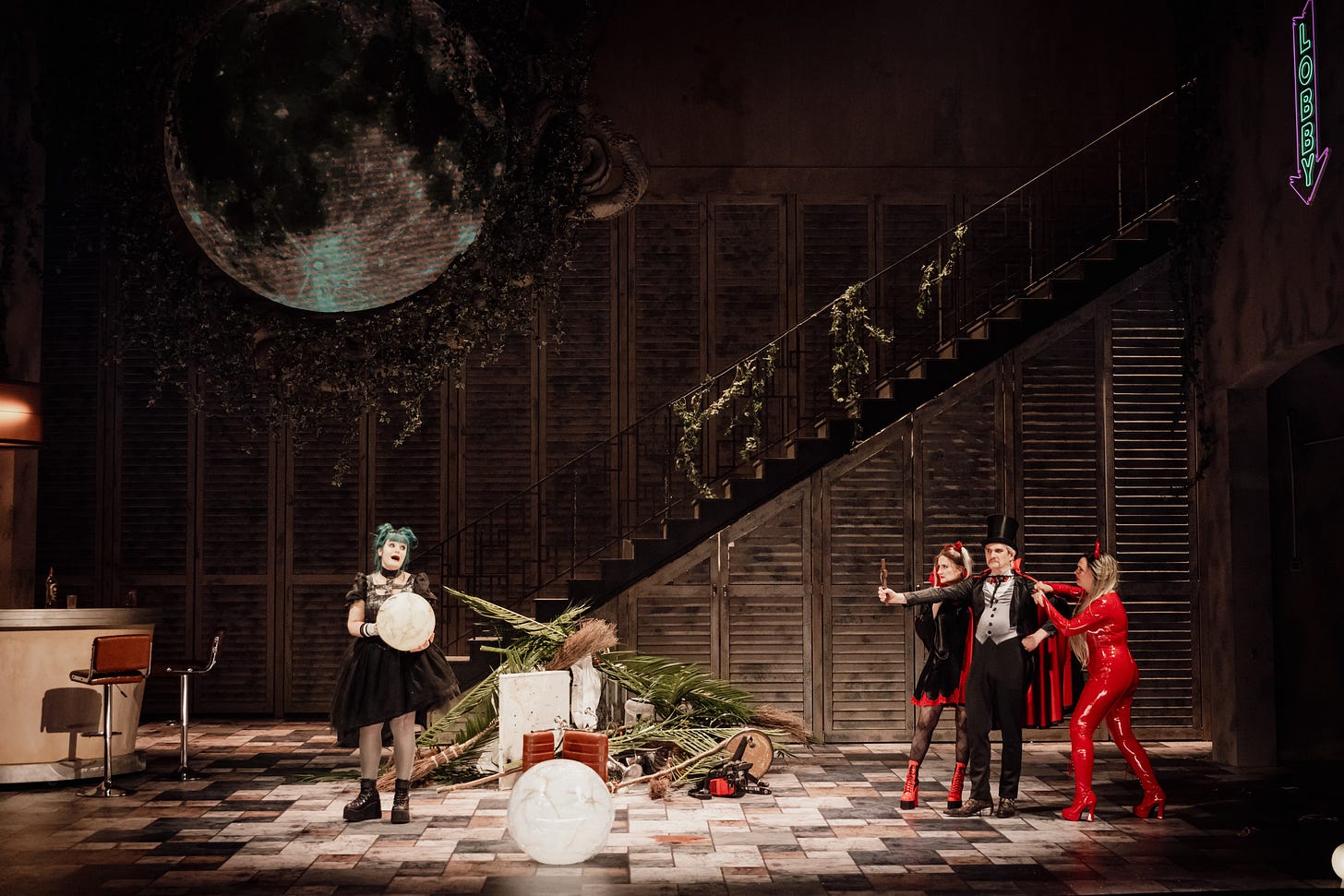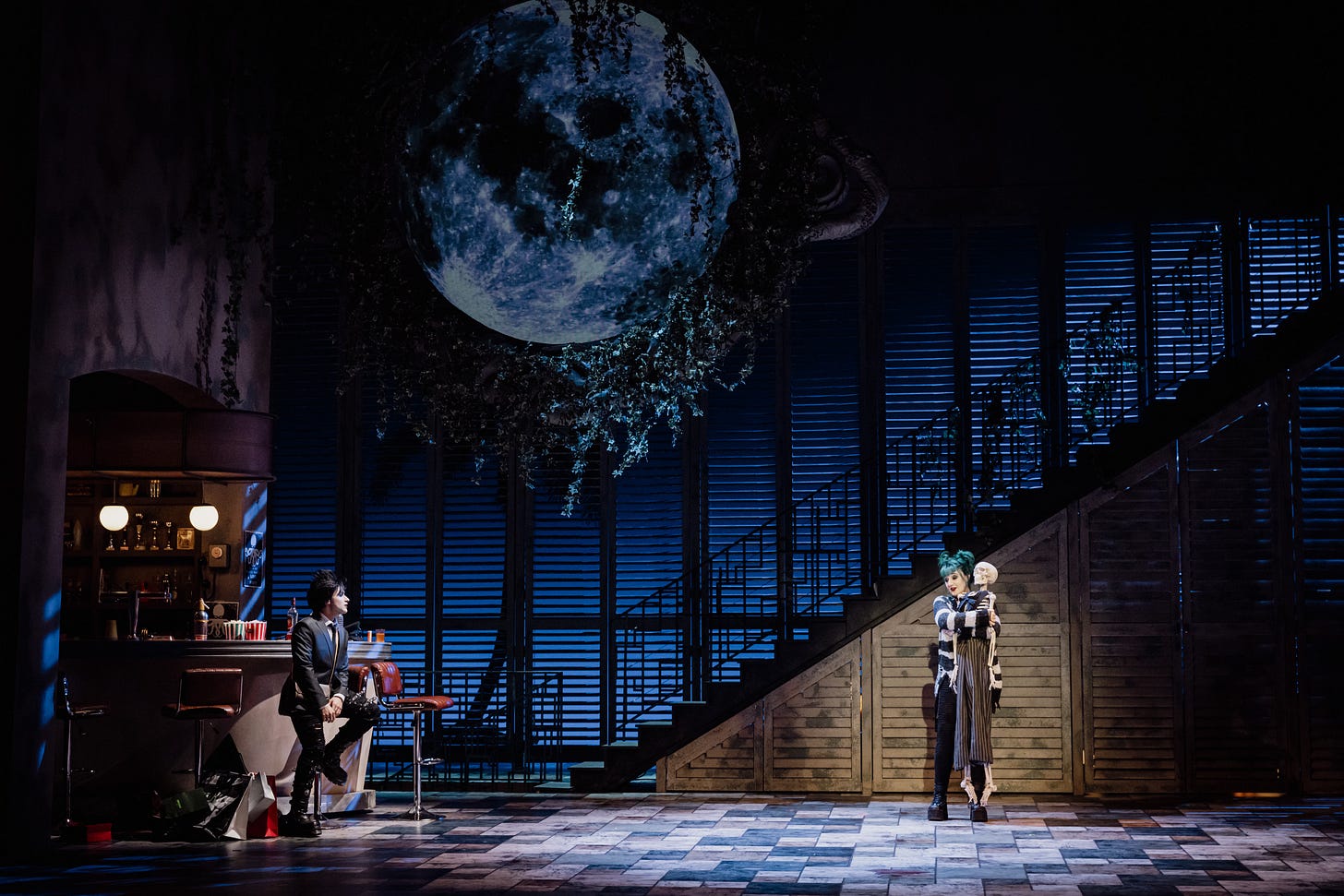Musical rewards in Tchaikovsky and Rossini
Jacques Imbrailo sings Eugene Onegin, Beth Taylor sings Cenerentola in Nancy
Letter scene: Enkeleda Kamani (Tatyana) singing vibrantly with Steven Beard (‘The Gardener) top left. Picture © Jean-Louis Fernandez
This review of Eugene Onegin first appeared on Oper! Magazin’s website in Jan Geisbusch’s German translation. An edited version of the English original is republished here, free to subscribers, by kind permission of Dr. Ulrich Ruhnke, Oper!’s editor.
Tchaikovsky wrote his ‘lyric scenes’ for students of the Moscow Conservatoire, who gave the premiere at the Maly Theatre in 1879. It was coolly received. The composer made his own libretto from Pushkin’s celebrated verse novella. With dance featuring in only two scenes, he feared the public would not take to an opera lacking spectacle.
Two years later at the Bolshoi, after minor revisions, Evgeny Onegin triumphed. It soon joined Glinka’s Ruslan and Ludmila and Mussorgsky’s Boris Godunov as one of the great operatic expositions of the Russian soul.
Even so, the intimate scale of its drama and the private tragedies of its central trio of characters are often suppressed in ‘grand opera’ stagings. These have tended to swing between extremes of interpretation. Dmitry Tcherniakow’s 2006 Moscow production alluded to the oligarchy in Putin’s Russia (drawing the public scorn of the great Russian soprano Galina Vishnevskaya), while Krzysztof Warlikowski’s 2016 Munich show referenced the composer’s attempt to mask his homosexuality by dramatising his ‘heterosexual’ experience with a young female student. Other directors, notably Robert Carsen at the Met and Barrie Kosky in Berlin and Zurich, have preserved an element of nostalgia and sentiment. Pushkin’s tale of doomed romances across the class divide can’t be updated without losing something essential.
Julien Chavaz’s production for the Opéra de Lorraine steers a cautious middle course through such widely differing conceptions (or conceits). First seen at Magdeburg, it is now restaged at Nancy by Alixe Durand Saint Guillain, but still resists easy understanding of its logic. Sanne Oostervink’s costumes are off-the-peg contemporary casual, so in the early scenes there isn’t much difference between peasant workers on the Larin farm and the bourgeois incomers Onegin and Lenski. Amber Vandenhoeck’s set for the first five scenes, played without a break, is an open space surrounded by rocks, with a tennis court marked out centre-stage — goodness knows why, because there’s not a tennis ball in sight. Could it be a metaphor for 21st century duelling? If so, it’s not an especially powerful one.
‘I love you Olga!’ Robert Lewis (Lenski) flanked by Julie Pasturaud (Madam Larina, left) and Héloïse Mas (Olga, right). Picture © Jean-Louis Fernandez
To the right of the stage is a large cage, from where Tatyana and Olga visibly sing their ‘offstage’ duet in the opening scene. A mysterious figure wanders about. It soon becomes clear that this is ‘the gardener’, a non-singing character whose ubiquity becomes irritatingly stage-hogging: he even joins the Larin family (as Tatyana’s father?) to write letters in the cage, while Tatyana is penning hers centre stage without the support of a desk or bed. He plays Onegin’s mute ‘second’ in the duel scene, gets his own solo jig in the ballroom scene, and in the finale brings potted plants to Tatyana’s Petersburg apartments — one of which Onegin smashes to the ground to vent his now unrequited amorous fury. Is any of this more than a director’s gloss?
In the absence of the original director there is a danger of some scenes falling flat: the choral choreography at the Larin ball looked perfunctory — perhaps to suggest peasant farmers aren’t good dancers? — and hadn’t improved by the time they re-appeared as aristo party-goers at the Gremin palace. As for the smart-casual dress-code, it was a bit of a let-down for the éclat of the final act.
The evening nevertheless had plenty of musical rewards, thanks to Marta Gardonlińska, the Opéra de Lorraine’s music director, and the committed playing of her orchestra. The chorus compensated for its awkward movement with full-throated singing, especially in the Russian song-and-dance routines of the opening scene.
At the Gremins’ Ball: Adrien Mathonat (the Prince), Kamani (Tatyana, now Princess) Picture © Jean-Louis Fernandez
And Nancy had assembled a mostly good-looking cast, all appropriate in age, with the exception on the unconventionally youthful Prince Gremin of Adrien Mathonat. This fine young Frenchman – as yet lacking the resonance in the lower register of a classic Slavic bass – is clearly a name to watch. He sang his Act 3 aria with a stream of rich legato sound, much appreciated by the audience.
Jacques Imbrailo’s manly Onegin contrasted with Robert Lewis’s more introverted Lenski. Although he still sports ringing high notes, Imbrailo has lost some of the sheen in the lower registers compared to the days when he emerged from Covent Garden’s Jette Parker Young Artists to star as Billy Budd at Glyndebourne. He captured Onegin’s aloof, world-weary ennui in the opening acts, diffident to the point where his bursts of passion and anger in Act 3 came as a surprise.
His Tatyana, the Albanian soprano Enkeleda Kamani, has something of the young Ermonela Jaho about her. She is an attractive singer and excellent actress who threw herself into the emotional cauldron of the role, occasionally at the expense of unfocussed higher notes: another singer to watch nonetheless. Lewis’s plangently sung, tragic Lenski gave the most vocally rewarding performance of the evening, singing both of his big solos with nuance and a wide palette of timbral colour. A most promising role debut.
Nancy does exceptionally well with the comprimarii: Julie Pasturaud made a bright-eyed, maternal, vocally plush Madame Larina, while François Piolino offered a youthful dandy of a Triquet in summer suit and boater hat. With his light tenor he gave a classic account of the role in the tradition of Hugues Cuénod, Michel Sénéchal and Christophe Mortagne. As Olga, Heloïse Mas sported a plush mezzo and flibbertigibbet personality. The younger-than-customary Filipyevna, Sophie Pondjiclis, sang with Babushka-like warmth. All told, a remarkable musical performance for a regional French theatre.
No-one for tennis: at the Larin Ball: Lewis (Lenski, left), Jacques Imbrailo (Onegin, right) and the chorus. Picture © Jean-Louis Fernandez
Earlier in the season I made my first visit to the Nancy theatre, a 19th Century building housed in the city’s exquisite 18th Century Place Stanislas (named in honour of Louis XV’s father-in-law, an erstwhile King of Poland) to see the supremely gifted Scots mezzo, Beth Taylor, in her role debut as Rossini’s Cenerentola. Here in the UK, she has shone in Handel at Glyndebourne, mostly in important secondary parts, Bradamante in Alcina, Cornelia in Giulio Cesare. In Nancy she was presented in a new production as a fully-fledged star in her own right. Her voice, while not especially Italianate in timbre, has flexibility in spades for Rossini’s heroine (and travesty heroes - she has already sung the male title role of Bianca e Faliero for Oper Frankfurt) and she threw off the spectacular vocal pyrotechnics of Cinderella’s final rondò with the liquid facility of a born Rossinian. I doubt there has been a more accomplished Brit in this repertoire since Della Jones or Patricia Kern - in my lifetime anyway.
Punk-goth Cinderella: Beth Taylor (Angiolina), Héloïse Poulet (Clorinda), Gyula Nagy (Don Magnifico), Alix Le Saux (Tisbe) Picture © Simon Gosselin
Taylor is tall for this role - slightly taller in flat shoes than her Prince Charming, Don Ramiro, the highly personable young American tenore di grazia, Dave Monaco - and, truth to tell, the team of director, Fabrice Murgia and costume designer Clara Peluffo Valentini make her look a tad ungainly - certainly unlikely material for a fairy-tale princess - in their off-key, nightmarish rather than dreamlike, production. The Belgian director is late to the live on-stage video-camera party (Emily Brassier, Giacinto Caponio, also credited with the lighting design) that one of its foremost progenitors, Katie Mitchell, has long since abandoned. Close-ups do not flatter the cast, at least in their punkish, Goth-style make-up and gear. One could argue that, Angelina and possibly her golden-winged “guardian angel” Alidoro apart, the characters of Rossini’s dramma giocoso are in any case grotesque caricatures, but exaggerating their malign traits are not necessarily conducive to comedy, even in this theatre-of-cruelty comedy. Taylor rose above the staging in her warm-toned bravura account of Angelina’s music, brightly supported by Giulio Cilona’s spirited, witty conducting. Despite the efforts of the production team, even as the household’s maid of all work, this Cenerentola was never a drudge (Scottish Opera should mount a new production for her) and she was complemented by a mostly stylish supporting cast: Monaco a promising addition to the lyric Rossini tenor fold, Gyula Nagy, a resonantly sung, if overacted Don Magnifico, Sam Carl, a black-voiced Alidoro. Of the principals only Alessio Arduini’s already worn-sounding Dandini was a vocal disappointment, but he remains a lively baritono buffo on stage, entirely idiomatic with the text. Both spiteful step-sisters were vividly portrayed by Héloïse Poulet (Clorinda) and Alix Le Saux (Tisbe, an erstwhile Cinderella in Massenet’s opera at Glyndebourne). Some musical rewards then, but ultimately a tiresome, even gruesome staging.
Unromantic couple: Dave Monaco (Don Ramiro), Taylor (Cenerentola) Picture © Simon Gosselin
Cast & Creative Teams
Evgeny Onegin: Opéra Nationale de Lorraine, Nancy
Evgeni Onegin Jacques Imbrailo, Tatyana Enkeleda Kamani, Lenski Robert Lewis, Olga Héloïse Mas, Prince Gremin Adrien Mathonat, Madam Larina Julie Pasturaud, Filipyevna Sophie Pondjiclis, Zaretski/A Captain Joé Bertini, Monsieur Triquet François Piolino, The Gardener Steven Beard A Peasant Wook Kang, (Chorus artist)
Orchestra and Chorus of the Opéra National de Lorraine, Nancy
Conductor Marta Gardolińska Director Julien Chavaz Revival Director Alixe Durand Saint Guillain, Sets Amber Vandenhoeck, Costumes Sanne Oostervink, Lighting Eloi Gianini, Choreography Laura García Aguilera
Performance attended: March 4, 2025
La Cenerentola: Opéra Nationale de Lorraine, Nancy
Angelina Beth Taylor Don Ramiro Dave Monaco Don Magnifico Gyula Nagy Dandini Alessio Arduino Alidoro Sam Carl Clorinda Heloïse Poulet Tisbe Alix le Saux
Conductor Giulio Cilona Director Fabrice Murgia Sets Vincent Lemaire Costumes Clare Peluffo Valentini Lighting/Video Emily Brassier, Giacinto Caponio
Orchestra and Chorus (Guillaume Fauchère) of Opéra National de Lorraine
Performance attended: December 19, 2024










Big fan of Beth Taylor - her Cornelia was beautiful, though I was already very impressed when she sang alongside Joyce in the Barbican's Dido and Aeneas.